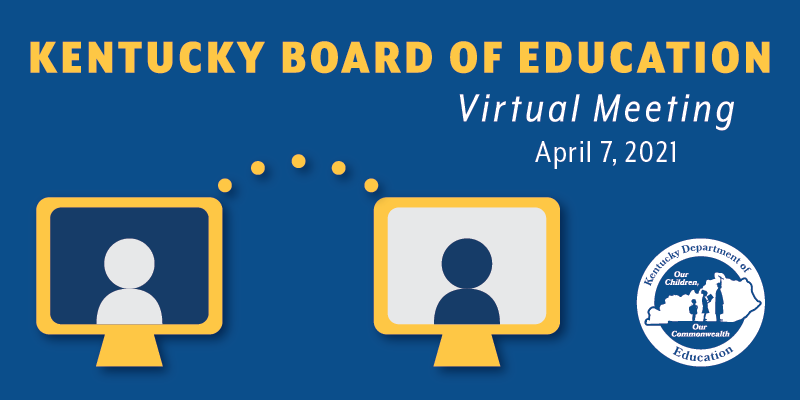 During their April 7 meeting, the Kentucky Board of Education (KBE) heard an update on the third round of federal Elementary and Secondary School Emergency Relief (ESSER) funding, which is on its way to Kentucky school districts.
During their April 7 meeting, the Kentucky Board of Education (KBE) heard an update on the third round of federal Elementary and Secondary School Emergency Relief (ESSER) funding, which is on its way to Kentucky school districts.
ESSER III is $2 billion in funds from the American Rescue Act, which was passed by Congress earlier this year.
“This is to help us continue to safely reopen and to sustain our safe operations in our schools for both our staff and our students” amid the COVID-19 pandemic, said Robin Kinney, associate commissioner in the Kentucky Department of Education’s (KDE’s) Office of Finance and Operations.
At least 90% of Kentucky’s share of ESSER III funding will be going to local school districts, but ESSER III has a requirement that school districts use at least 20% of their allocation to address learning loss from extended school closures due to the pandemic. That must be done through the implementation of evidence-based interventions that respond to students’ social, emotional and academic needs, and address the disproportional impact of COVID-19 on underrepresented student groups.
As far as the other 80%, “like with ESSER I and II, the other eligible expenses are very similar,” said Kinney.
Up to 10% of ESSER III funding can go to the state set-aside, where there are three specific state reservations. Five percent must go to the implementation of evidence-based interventions, specifically addressing learning loss at the state level. One percent must be used for evidence-based summer enrichment programs, and another 1% must be used for evidence-based, comprehensive after-school programs.
Currently, ESSER I funds are in the process of being administered to school districts.
KDE Associate Commissioner Kelly Foster joined the meeting to present a summary of recent changes to Kentucky’s flagship Healthy at School COVID-19 guidance, based on guidance from the U.S. Centers for Disease Control and Prevention (CDC). The first is that students must now maintain a social distance of at least 3 feet in the classroom, instead of the previous 6 feet. The second is that students no longer need to have their temperature checked when boarding a school bus or entering a school building unless they are symptomatic.
Guidance from the CDC may continue to change as the pandemic evolves, and as it does, KDE and DPH will continue to update Healthy at School and other COVID-19 guidance documents.
Student’s Perspective on a Global Pandemic
Rockcastle County Middle School student Anna Chaliff presented the KBE with a student’s perspective on life during the pandemic, and talked about how her life changed when schools began to shut down on March 12, 2020.
“The last year has been filled with changes, challenges and Google meets,” Chaliff said.
Chaliff discussed the struggles of maintaining a routine, keeping up with schoolwork, the lack of interaction with friends and internet connectivity issues. She talked about the toll the pandemic took on mental health, saying she fell into a depression for several weeks when she found out the church camp she had been looking forward to was canceled.
While it has been difficult, Chaliff said there also have been some benefits from virtual learning. For example, the Chromebooks the school district provided to students have been a convenience for Chaliff and many others. She said she also spends more time communicating with fellow students whom she normally would not see much throughout the day, such as her homeroom classmates, and has direct access to her teachers that she did not have before.
Chaliff said students have had to overcome wearing masks, transitioning to online school and changing schedules.
“It’s something we’ve had to learn to work with and adapt to,” Chaliff said.
She said she enjoys being a member of her school’s academic team, but due to the pandemic, competitions have been canceled and recruitment has been difficult. She expressed that she appreciates the work of her teachers, school district and the KBE to make things easier for students during this challenging time.
KBE member JoAnn Adams told Chaliff she is “an exceptional example of what our Kentucky students are capable of.”
Solyana Mesfin, the KBE’s ex officio student member and a junior at Eastern High School (Jefferson County), praised Chaliff for her courage to share her experience with the board.
“We truly need more students to come up and present their experiences,” Mesfin said.
When KBE member Patrice McCrary asked Chaliff to name one thing she has seen throughout the pandemic that schools should keep in place, Chaliff said the interaction between students and teachers.
“When we’re in person, keeping those relationships with teachers to students, making them feel comfortable,” Chaliff said. “School isn’t just about academics. It’s about relationships, too.”
Rockcastle County Schools Superintendent Carrie Ballinger also provided background on the school district’s operations at the beginning of the pandemic. As Rockcastle County was not a non-traditional instruction (NTI) district, when its schools closed their doors in March 2020, NTI packets had to be created and mailed by the central office staff two weeks at a time.
Ballinger was hired as superintendent in June 2020, and worked to make changes to support students and their families during an unprecedented time. The district provided Chromebooks for all students in grades K-12, along with teacher training for Google certifications, and developed a district-led technology team. It also focused on school-based mental health and formed stakeholder task force groups.
To help students continue to get meals, the district created 45 community feeding sites through a partnership with the Christian Appalachian Project.
“We have handed out and delivered almost 120,000 meals to our families,” Ballinger said.
Commissioner’s Report
During Commissioner of Education Jason E. Glass’s presentation to the board, he discussed KDE’s request to the U.S. Department of Education for a waiver on the accountability, school identification and reporting requirements of the Elementary and Secondary Education Act (ESEA) for the 2020-2021 school year. The waiver is meant to address the situation stemming from the extended and widespread school closures due to the pandemic, and support the advancement of student academic achievement by maintaining the integrity of Kentucky’s accountability system.
“By waiving school accountability for the 2020-2021 school year, Kentucky will avoid concerns and doubts about the comparability of accountability determinations within and across years,” Glass said.
Glass also updated the KBE on the reopening of the Kentucky School for the Blind (KSB) and the Kentucky School for the Deaf (KSD), both of which resumed in-person instruction on March 1. While families had the option of students continuing virtual instruction, 71% of KSB students and 72% of KSD students returned in person.
Glass said that 37 Area Technology Centers (ATCs) still are operating on a hybrid schedule, with 14 operating solely face-to-face. ATC students currently are completing industry certifications and end-of-program assessments.
Glass also noted that April 6 was the first “stop” on the Commissioner’s Virtual Listening Tour, with nine sessions being held across the state through May 6. However, due to technical difficulties during the first stop, Glass announced another Louisville session will be added. The sessions will be in the evening and last about 90 minutes, and feature breakout rooms facilitated by Kentucky high school students and KDE staff.
“I have been so excited to hear directly from our education stakeholders across the state, with an effort to evoke and hear personal stories about their own educational experiences,” said Glass.
In February, KDE shared its plan to develop a strategic dashboard to provide a transparent reporting of indicators and long-range goals benchmarked against other states. Glass presented to the board the proposed metrics for the dashboard, which include both academic and non-academic indicators, as well as aspirational metrics.
The proposed academic indicators include graduation rates and comparing ACT language and math scores against 14 states that use the ACT statewide. Non-academic indicators include student engagement and equitable access to effective educators.
While many board members commended the work done on the dashboard, some provided additional suggestions.
Randy Poe said he would like to see more “formative opportunities” on the dashboard.
“We know that sometimes those outcomes are going to be determined by the access and opportunity that we provide kids,“ Poe said.
In other business, the board:
- Swore in new KBE member Jamie Bowling;
- Approved of the recipient of the Karem Award for Education Policy;
- Appointed State Evaluation Appeals Panel (SEAP) members;
- Heard reports from Aaron Thompson, president of the Kentucky Council on Postsecondary Education, and Susan Rieber, chief of staff for Lt. Gov. Jacqueline Coleman;
- Approved consent agenda items:
- Repeal of 701 KAR 5:080, Application for Approval of Alternative School-Based Decision Making Model,
- SBDM Alternative Model Applications,
- Amendment to 703 KAR 5:225, Continuous Improvement Planning for Schools and Districts,
- New District Facility Plans,
- Amended District Facility Plans, and
- Approval of Kentucky Minimum Specifications for School Buses;
- Presented the Robinson Award for Diversity and Equity in Public Education to Kyri Demby, a K-5 music and art teacher at Jacob Elementary School (Jefferson County), and Diane Porter, the Jefferson County Public Schools board chair and a Louisville public school graduate who has served nearly 40 years as a teacher, guidance counselor, assistant principal, principal and central office administrator;
- Approved a request from Jefferson County Public Schools to waive 704 KAR 5:070, Common Kindergarten Screener for the 2020-2021 school year;
- Approved an amendment to Guidelines for Alternative Models for School-Based Decision Making;
- Approved amended Federal Perkins Performance Goals;
- Approved an amendment to Inclusion of Special Populations in the State-Required Assessment and Accountability Programs;
- Approved a request from Hardin County Schools to waive 702 KAR 4:160, Capital Construction Process, Section 6 (1)(c)4.c.(ii) and Section 305.5 of the Kentucky School Facilities Planning Manual, incorporated by reference into 702 KAR 4:180, related to allowable floor area of the additions to and renovation of Central Hardin High School;
- Approved a request from Clay County Public Schools to waive the site improvement cost limitation of 10% of the total project budget;
- Heard an update on state-assisted districts from KDE Associate Commissioner Kelly Foster, Menifee County Superintendent Tim Spencer and Breathitt County Superintendent Phillip Watts;
- Heard an update on the 2021 legislative session of the Kentucky General Assembly and the 2021-2022 KDE budget;
- Heard an update on the KDE 2022-2024 Biennial Budget and Capital Plan Update; and
- Heard a financial report from the Ashland Independent Schools.




Leave A Comment